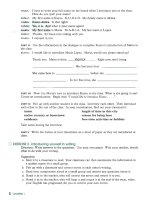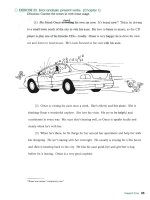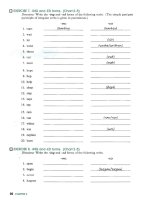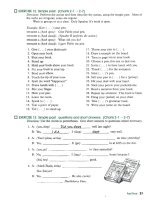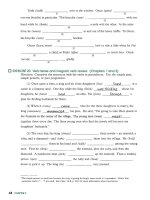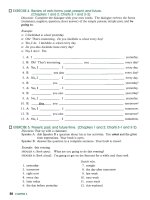Fundamentals of english grammar third edition part 5 docx
Bạn đang xem bản rút gọn của tài liệu. Xem và tải ngay bản đầy đủ của tài liệu tại đây (379.43 KB, 7 trang )
16
CHAPTER
I
1-6
NON-ACTION
VERBS
.
~ ~.
~~
.
~
.
~.
I
INCORRECT:
I
am knowing Ms. Chen.
(b)
I'm
hungry.
I
want
a sandwich.
INCORRECT:
I
am wanting a sandwich.
(c) This book
belaps
to Mikhail.
INCORRECT:
This book
ir
belomirp
w
Mikhail.
S~ms
vuur
us
uvr
uvsu
ux
~IU~LS~IYS
LSU~S~.
ILKIF
verbs are called "non-action verbs." They express
a
situation that exists, not an action
in
progress.
NON-ACTTON
VERBS*
hear believe be
see thinkt exist
sound undcrsrand
knav
m
need like
fmget
hamt want he remember
possess mfe* hate
belong
*COMPARE
(d)
I
think
that grammar is easy.
(e) I
am thinking
about grammar right now.
(f)
Tom
has
a car.
(g)
I'm
having
a good time.
Think
and
have
can be used
in
the progressive.
In
(d):When
think
means "believe," it is nonprogressive.
In
(e):
When
think
expresses thoughts that are
going through a person's mind, it
can
be progressive.
In
(f):When
haw
means "own" or expresses
possession, it is not used
in
the progressive.
(g):
In
expressions where
hak
does not mean
"own* (e.g.,
have a good rime, have a
bad
rime, have
trouble, have a
ploblern,
have company, have an
opera&),
haw
can
be
used
in
the progressive.
I
*Nan-ncdon
verbs
are
also
called
"stative vubs"
or
"nonpmgrcssive verbs?'
EXERCISE
19.
Progressive verbs
vs.
non-actlon verbs.
(Chart
1-6)
Direcrions:
Complete the sentences with the words in parentheses. Use the simple present
or the present progressive.
1.
Right now
I
(look)
aw
\oohs
at the board.
I
(see)
some words on the board.
2.
A:
(you, need)
some help, Mrs. Brown?
(you, want)
me to carry that box for you?
B: Yes, thank you. That's very
kind
of you.
3.
A.
Who is that man?
I
(think)
that
I
(know)
him,
but
I
Cforget)
his name.
!
.
,
B: That's
Mr.
Martinez.
.tI,
.
A:
That's right!
I
(remember)
hi
now.
4.
A:
(you,
believe)
in
flying
saucers?
B:
What
(you, talk)
about?
A:
You know, spaceships from outer space with alien creatures aboard.
)
'B:
In
my opinion,
flying
saucers
(exist)
only in people's
imaginations.
Present nme
17
5. Right now the children
(be)
at the beach. They
(have)
a good time. They
(have)
a beach
ball, and they
(play)
catch with it. They
(like)
to play catch. Their parents
(sunbathe)
. They
(w)
to get a tan.
:/
i
:
":
ney
to music on a radio. They also
(hear)
the sound of seagulls and the sound of the waves.
6.
A:
What
(you, think)
about right now?
B:
I
(think)
about seagulls and waves.
A:
(you, like)
seagulls?
B: Yes.
I
(think)
seagulls are interesting birds.
7.
A:
Which color
(you,
prefer)
,
red or blue?
B:
I
(like)
blue better than red. Why?
A:
I
(read)
a magazine article right now. According
to the article, people who
(prefer)
blue to red
(be)
calm and
(value)
honesty and
loyalty in their Wends. A preference for red
(mean)
that a
person
(be)
aggressive and
(love)
excitement.
B: Oh? That
(sound)
like a bunch of nonsense to me.
18
CHAPTER
1
8.
A:
Does the earth turn around and around?
B:
Yes, Jimmy. The earth
(spin)
around and around
on its axis as it circles the sun. The earth
&in)
rapidly at this very moment.
B:
Really?
I
can't feel it moving.
(you,
ny)
to fool me?
A:
Of
course not!
(you,
think, really)
that the earth isn't moving?
B:
I
guess so. Yes.
I
can't see it move. Yes. It isn't moving.
A:
(you, believe)
only those things that you can see?
Look at the trees out the window. All of them
(grow)
at this very moment, but you can't see the growth. They
(ger)
bigger and bigger with every second that passes. You can't see the trees grow, and
you can't feel the earth spin, but both events
(rake)
place at this moment while you and
I
B:
Really? How do you know?
1-7
PRESENT VERBS: SHORT ANSWERS TO YESlNO
QUESTIONS
I
R
QUBSlTON
SHORT
ANSWER
LQNG
ANSWER
QuESlTONSm
LW~DOES
Does Bob
like
tea? Yes, he does. Yes, he likes tea.
No, he doeata't. No, he doesn't like tea.
Do
you
like
tea?
Yes,
I
do. Yes,
I
lie tea.
No,
I
don't.
No,
I
don't like tea.
QUESTTONS
WITH
BE
Are
you srudytng? Yes,
I
am.* Yes,
I
am
(I'm)
studying.
No, I'm not.
No,
I'm
not studying.
IsYoko
a
student? Yes, she
is.*
Yes, she is (she's) a student.
No, she's not.
OR
No, she's not a student.
OR
No, she isn't.
No, she isn't a student.
Aro
they srudyt'ng?
Yes, they are.*
Yes,
they
are (they're) studying.
No, they're not.
OR
No, they're not studying.
OR
NO,
they aren't.
NO, they
aren't
1
smdying.
*Am,
is,
and
are
are
not
wnmctcd
with
pronouns
in
short
answers.
~CORRPCTSKORTAN~WER~:
58,
I'm.
Ya,
shb'~.
k,
I,%.
Present Tlrne
19
0
EXERCISE
20.
Short answers to yeslno
questions.
(Chart
1-7)
Directions:
Complete the following dialogues by using the words in parentheses. Also give
short answers to the questions as necessary. Use the simple present or the present
progressive.
1.
A:
(Mary, have)
Does
Maw
have
a bicycle?
B: Yes,
she Aoes
.
She
(have)
has
a ten-speed bike.
2.
A:
(it,
rain)
right now?
B: No,
.
At least,
I
(think, not/
so.
3.
A:
(your
ftimds,
write)
a lot of e-mails?
B: Yes,
.
I
(get/
lots of e-mails all the time.
4.
A:
(the students, take)
a test in class right now?
,I8>
B: No,
.
They
(do)
an exercise.
5.
A:
(the weather, affect*)
your mood?
B: Yes,
.
1
(get)
grumpy when it's rainy.
6.
A:
(Jean, study)
at the library this evening?
B: No,
.
She
(be)
at the recreation center.
She
(pkfy)
pool with her friend.
(Jean, Play)
pool every evening?
.
-
No,
.
.
She usually
(study) . .
:
.t
(she, be)
good player?
Yes,
(Play)
(YOU,
Play)
Yes,
But
I
(be,
not)
very good.
,,
.
i
:
ill
14,
r
:!:
,!.,I.
,.
.
,
.
.
,
,#
EXERCISE 21. Short answers to yeslno questions. (Chart 1-7)
Directions:
Answer the questions with books closed. Give both a short and a long answer.
Work in pairs or as a class.
Example:
Is Texas south of the equator?
+
No,
it isn't. Texas kn't south of the equator.
OR
I
don't know.
1.
Do you wear a wristwatch every day?
2.
Is
(
.
.
.
)
sitting next to
(
.
.
.
)
today?*
3.
Does
(
. . .
)
usually sit in the same place every day?
4.
Are
(
. . .
)
and
(
. . .
)
standing up?
5.
Are you interested in politics?
6.
IsToronto in western Canada?
(Switch mles
if
working in pairs.)
7.
Do whales lay eggs?
8.
Does your country have bears in the wild?
9.
Are dogs intelligent?
10.
Is
(
. . .
)
from Cambodia?
11.
Is the earth turning on its axis and rotating around the sun at the same time?
12.
Do all mosquitoes carry malaria?
EXERCISE 22. Review: present verbs. (Chapter
1)
Directions:
Complete the sentences by using the words
in
parentheses. Use the simple
present or the present progressive. Supply the short answer to a question if necessary.
1.
A:
My sister
(have)
has
a new car. She bought it last month.
B:
(yoy have)
Do
YO^
have
a car?
A:
No, I
doh1+
.
Do you?
*
,
B: No, but I have a ten-speed bike.
1
.
2.
A:
Where are the children?
B: In the living room.
A:
What are they doing?
(they, watch)
TV?
,
.
.
,
.
No, they
.
They
(play)
a game.
3.
A.
Shhh. I
(hear)
a noise.
(joy
hear)
it, too?
B: Yes, I
.
I wonder what it is.
4. A:
Johnny,
(you, listen)
to me?
B:
Of course I
am,
Mom. You
(want)
me to take out the
garbage. Right?
A:
Right! And right now!
*The
symbol
(
.
. .
)
means "supply
the
name
of
a
person."
5.
A:
Knock, knock! Anybody home? Hey, Bill! Hi! It's me. I'm here with Tom.
Where are you?
B: I
(be)
in the bedroom.
A:
What
(you,
do)
?
B: I
(ny)
to
sleep!
A:
Oh. Sorry.
I
won't
bother you. Tom,
shhh.
Bill
(rest)
6.
A:
What
(you, think)
about at night before you fall asleep?
B: I
(think)
about all of the pleasant things that happened
during the day.
I
(think,
not)
about my problems.
7.
A:
A
penny for your thoughts.
B:
Huh?
A:
What
(you,
think)
about right now?
B: I
(think)
about English grammar. I
(think, not)
about anything else right now.
A:
I
(believe,
not)
you!
.
.
'
.:
,
;
'
8.
A:
(you, see)
that man over there?
B:
Which
man? The man
in
the brown jacket?
%
.A:
No,I
(talk)
about the man who
(wear)
the blue shirt.
B: Oh, that man.
A:
(you, know)
him?
B: No, I
(think, not)
so.
9.
A:
(you, know)
any tongue-twisters?
B: Yes, I
.
Here's one: She sells seashells down by the seashore.
'*I
'A:
That
(be)
hard to say! Can you say this: Sharon wears Sue's shoes
to zoos to look at cheap sheep?
B: That
(make, not)
any sense.
A:
I
(know)
22
CHAPTER
1


